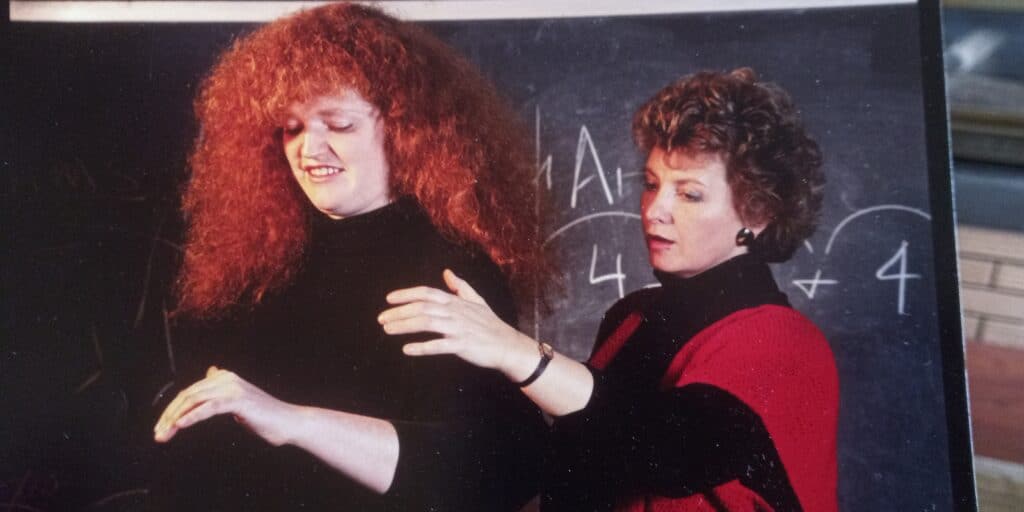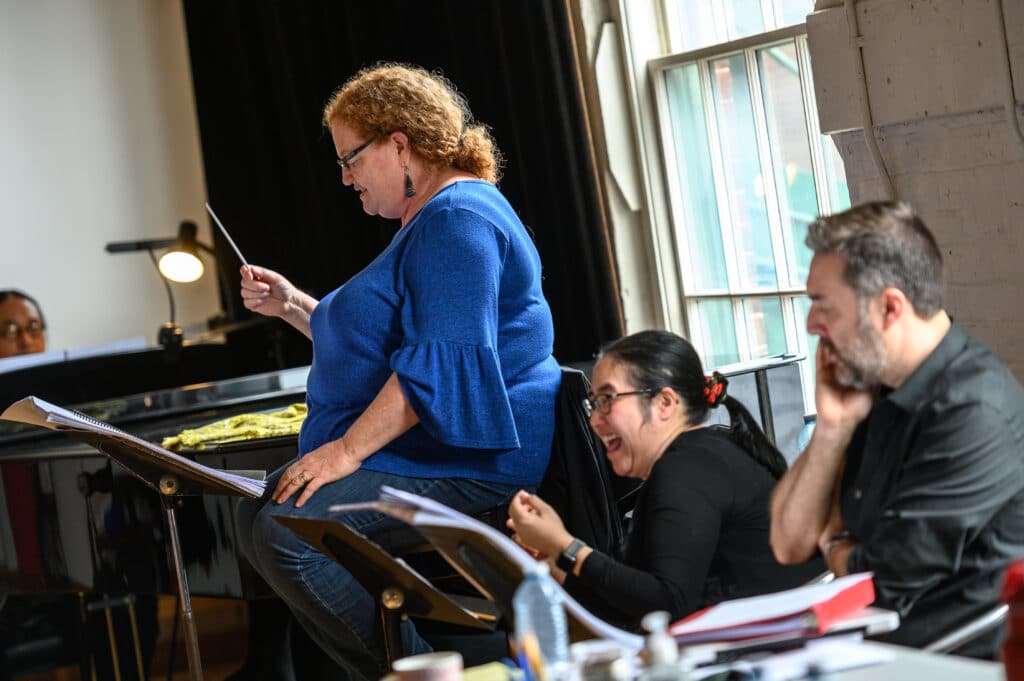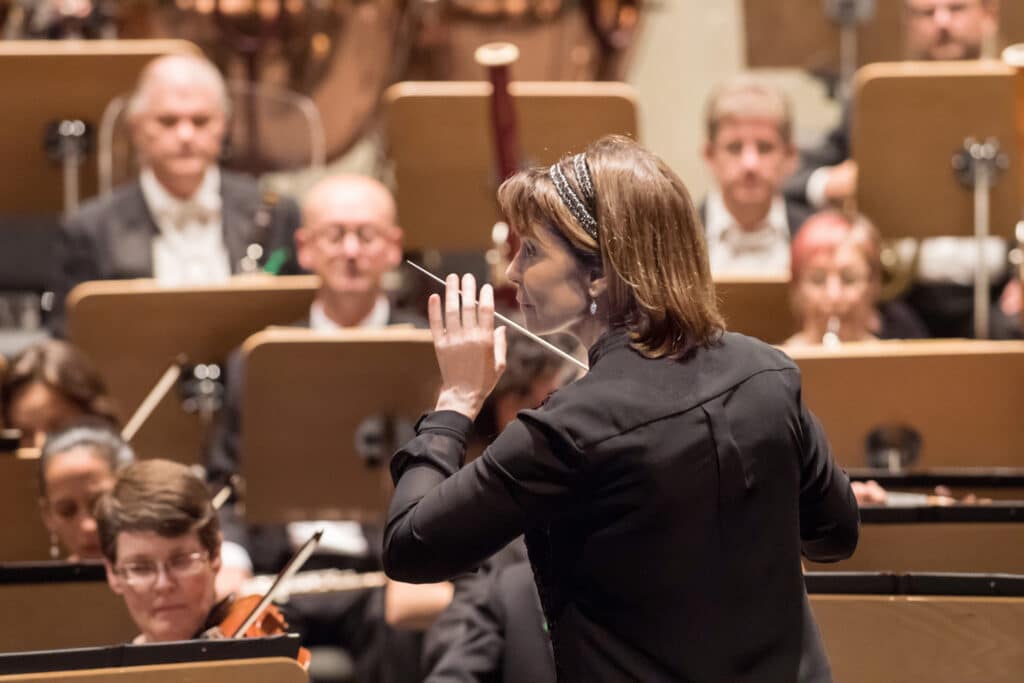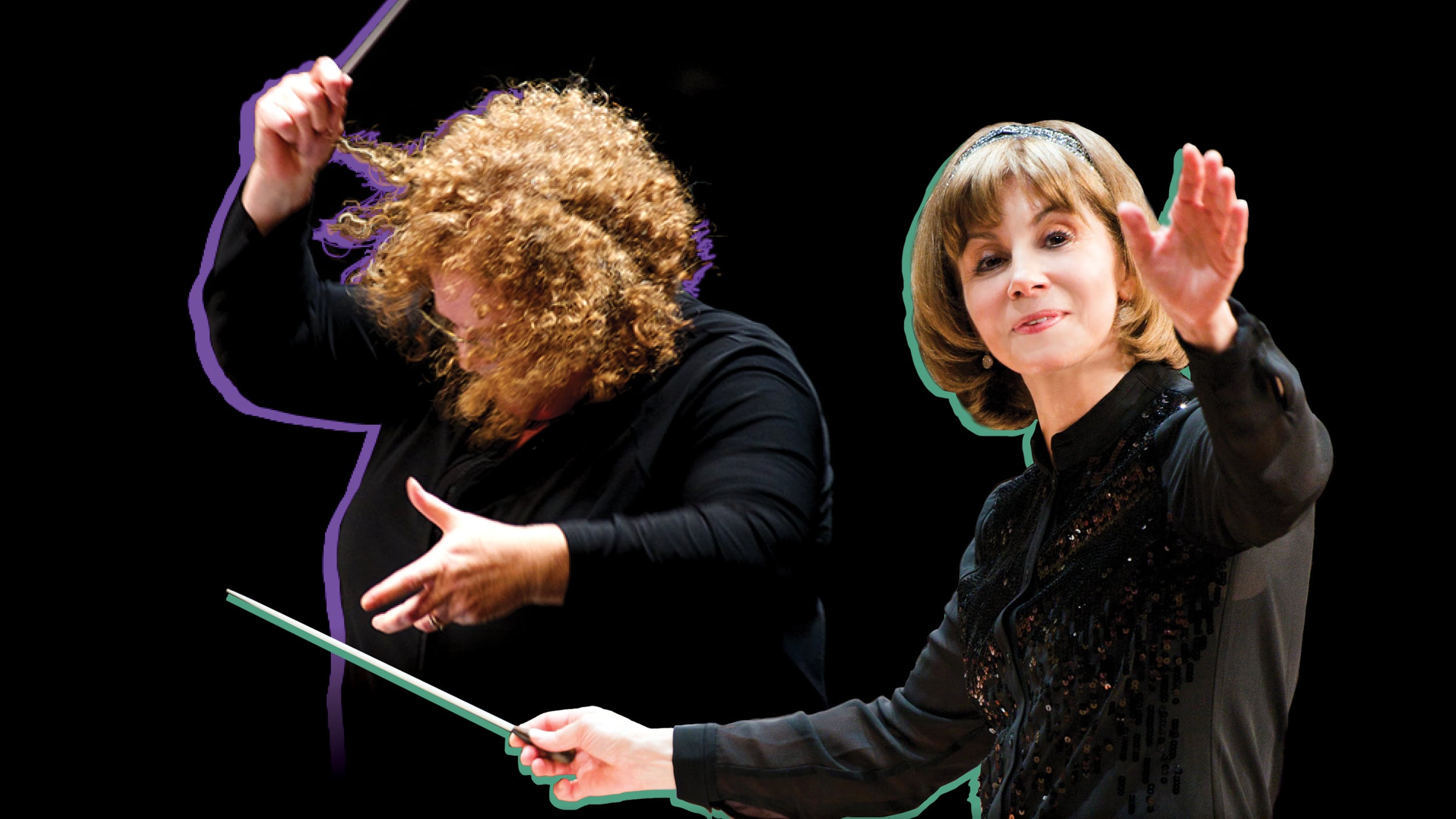Conductors Falletta and Thomson have outstanding classical music careers – now they’re mentoring the next generation of leadership
They are leaders in their craft and at the top of their game: JoAnn is currently Conductor at Buffalo Philharmonic Orchestra; Rosemary is Interim Artistic Director at Opera Kelowna and Music Director & Conductor at Okanagan Symphony Orchestra.
Now the conductors are taking on a new project as Career Mentors, vital roles in Tapestry Opera’s innovative conducting program Women in Musical Leadership. The pair recount their journeys onto the podium and reflect on the role mentorship played in their careers.
How did you train?
JF: I started my musical training on classical guitar but also studied music theory and ear training in addition to piano as a child and teenager. For my undergraduate studies I entered the Mannes School of Music as a guitar major and transitioned to a dual guitar and conducting major in my second year. I selected Juilliard for my Masters and Doctorate because of its excellent conducting program led by Maestro Jorge Mester. I also had the privilege to study for many years with Maestro Sixten Ehrling.
RT: I had two mentors that gave me the idea that I could conduct, Ann Cooper Gay and her husband, Errol Gay. Ann brought me in to work with the High Park Girls Choir, and at that point I really fell in love with the feeling of the sound coming back to me.
I applied to the special programme in Conducting at the University of Toronto, I had graduated there with my undergrad in piano. I remember sitting late at night and looking at the sign on the bulletin board thinking: I wonder if they would take a woman in the conducting programme? I applied – I didn’t get in the first year, but I did the second.
The rest of my training was much less formal, and much more practical. I spent three summers as the Assistant Conductor, and eventually the Personnel Manager and Librarian, of the Boris Brott Summer Festival in Hamilton Ontario; I conducted four community orchestras at one time; I did workshops; and I put together my own charity shows with friends at the University of Toronto.

What opportunities existed for you?
JF: My first professional conducting position was with the Denver Chamber Orchestra followed by positions with the Milwaukee Symphony, the Bay Area Women’s Philharmonic, the Long Beach Symphony, the Virginia Symphony, the Ulster Orchestra, the Hawai’i Symphony and the Buffalo Philharmonic.
RT: You have to get in front of players. No textbook is going to take the place of that learning opportunity. At the start of my career I sought out any workshop that I could, because I knew I wasn’t at a place where I was going to be offered professional conducting opportunities. I went after lots of opportunities that I didn’t get, but you have to just keep going after them.
I did the Contemporary Opera programme at the Banff Centre, a time which really changed my life. I met James Rolfe, the Artistic Director of Continuum Contemporary Music at the time. He saw me conduct something in a showcase in Banff, and hired me on the spot to conduct a concert with Continuum back in Toronto. It was my first professional hired gig, and I went on to conduct with that group for 14 years.
It was a time that I thought wow, someone’s paying me to do this thing that I love! From there I won auditions to learn on the job in professional conducting residencies with Bramwell Tovey at the Winnipeg Symphony, Hans Graf at the Calgary Philharmonic and to assist Richard Bradshaw at the Canadian Opera Company. These residencies gave me the chance to put my 10,000 hours in on the podium, but also to learn first hand about being a music director from some giants in our profession.
What is your career highlight?
JF: There are so many events and concerts that were personal and memorable for me, but let me at least mention as highlights my Carnegie Hall concerts with the Virginia Symphony and Buffalo Philharmonic.
RT: My first Beethoven Nine is a definite standout. But actually, I hope my career highlight is still in front of me! I love the big, iconic works like Orff’s Carmina Burana and Verdi’s Requiem that combine the forces of chorus and orchestra. When I got to be the one that’s leading them it was euphoric.
I think because I also grew up singing, I love every opportunity to conduct opera. Being the Music Director for the world premiere of Yvette Nolan and Dean Burry’s Shawnadithit for Tapestry Opera and Opera on the Avalon was one of the most deeply gratifying experiences of my career.

What have you learned over the course of your career?
JF: For me the most important thing about conducting is being keenly aware that the orchestra itself is actually making the music, not the baton! I firmly believe that each performance comes from the collective hearts, brains and spirit of the musicians who are involved, and that because of that, each orchestra’s performance will be unique.
I like to be flexible in allowing the orchestra to play a major role in informing the performance, revealing their own strengths and personality. Does the orchestra’s hall enable them to play refined and varied dynamics? The conductor should allow that to happen! Do the woodwind players revel in their individuality of approaches? So should the conductor! Does the orchestra enjoy rhythmic flexibility and rubato? Does the string section have a unified approach to articulation and bow stroke? Does the brass section exemplify brilliance or warmth in their artistic approach?
To me it is a delight that each orchestra I conduct can sound quite unique in exactly the same repertoire – and what a shame it would be to try to make each orchestra sound exactly alike!
RT: There’s a transition that happens for everybody in leadership at some point in their lives, where you stop feeling like an imposter and you realise that you have the skills. I think that the most important thing that I learned (and I’m still learning it) is to trust that I can do things my way that fit me best.
I’ve been mentored a lot, but the key for me is to take from them what works for me, and to be authentic. That gets clearer and clearer as I have gained maturity and experience. I’m not trying to be somebody that I’m not, instead I’m really going after my authentic connection to the music, to the musicians that I get to perform with, and to our audience.
And that, to me is what’s going to make me the best musical leader that I can be.
What are your favourite kinds of pieces to conduct?
JF: I am fascinated by the seeming limitlessness of the orchestral repertoire. It is as if the body of work is a vast iceberg and we are only playing the tip of it!
I may not have a favorite piece but I may have a favorite period of music to conduct – the start of the 20th century was an extraordinary time where composers were branching out from romantic nationalism in so many unique ways harmonically, rhymically and structurally; all the while expanding the woodwind, brass and percussion sections creating a luminous orchestral palette.

RT: That’s hard, it’s like asking who’s your favourite child!
I guess it’s whatever I’m conducting at the time. But having said that, I do have an affinity for certain composers. I love Britten, Ravel, Debussy. And there’s something about Beethoven’s rhythmic drive that I dig into with great relish. I love thinking about colour and texture in music and the combination of text and music, voice and orchestra, and dramatic, musical storytelling is why I love conducting opera.
If someone didn’t know anything about conducting, what would you want them to know?
The conductor is a catalyst for change […] radiating the reflected glow of the talented players around them.
JoAnn Falletta
JF: Conducting in a sense is the art of persuasion by which musicians come to share a deep connection to the music they are playing – and to convey that passion to the audience. The image of the conductor on the top of a pyramid is exactly the reverse of the real situation. The pyramid is inverted and the conductor supports and empowers every musician, creating a situation where they can feel both independent and protected.
The conductor is a catalyst for change, sparking thought, offering possibilities, and radiating the reflected glow of the talented players around them. The art of performance is deeply embedded in the spiritual, psychological and artistic tradition of transformation.
RT: What I’m striving for when I’m conducting is to move beyond the technical requirements of keeping people together and setting tempos. Instead, to facilitate and inspire the musicians to bring the music off the page and connect directly with the audience so that it’s much more than just an upbeat and a downbeat – it instead becomes a realisation of the composer’s vision through the unique personality and humanity of that group of musicians. If each musician feels supported and encouraged from the podium to play at the top of their game they will shine, and if they shine, so will Beethoven. Plus, it’s fun!
What role did mentorship play in your early career?
JF: For all young artists a mentoring relationship can be essential to their development. Instrumental in my development were my studies with Maestros Mester and Ehrling, and my studies at the Mannes College of Music. I was also privileged to have masterclasses with Leonard Bernstein at the Juilliard School.
RT: I needed others to believe that I had the potential for this before I could truly believe in myself. And I think it does have something to do with the fact that I didn’t see a lot of women on the podium, so I had doubt that it was a career that I would be allowed to pursue.
I felt so strongly that conducting was something I loved that I just kept putting myself out there – even though it was hard. My mentors never made me feel that because I was a woman I shouldn’t be a conductor. Ever, and for that, I am very grateful.
Some conductors have the confidence to get up there right from the get go. I had to grow into that confidence, to dig in and feel like I had earned the right to step on the podium. And that was what mentorship gave me above everything, the gift of believing in myself. Which is why it’s so important to me to become a mentor for others.
The next generation of conductors will be finally the one that stops saying ‘female conductor’ and just says ‘conductor’.
Rosemary Thomson
Why are you participating in the Women in Musical Leadership program?
JF: Women In Musical Leadership is a fantastic program that is supporting and preparing Canadian women for careers in opera and orchestral conducting.
RT: I’m a passionate teacher. My mom was a teacher and I think I got that from her. I love seeing potential in others and helping them see it in themselves. I think that that’s a really important role as a mentor.
I was assisting David Agler on Stravinsky’s The Rake’s Progress at the Banff Centre and I got to conduct a semi-staged understudy cast with the orchestra. On the night of my performance David was so nervous for me that he actually said to one of my friends that he would rather conduct the Ring Cycle from memory! It wasn’t that he didn’t think I could do it, he just cared so much about me succeeding. It was a huge moment for him as a mentor. I can appreciate that now that I’m mentoring younger conductors, because you want to give them the wings to fly and then get out of the way.
What is the potential of the Women in Musical Leadership program?
JF: The Women in Musical Leadership has the potential to be a key educational source in preparing women for a career in conducting.
RT: Infinite.
I think that the next generation of conductors will be finally the one that stops saying ‘female conductor’ and just says ‘conductor’.
We’re going to change the perception by providing opportunities for multiple women to see themselves in that role. And over time, the programme won’t be necessary anymore. Then we’ll know we’ve succeeded.
Find out more about the Women in Musical Leadership program and the inspiring team involved in the project.
